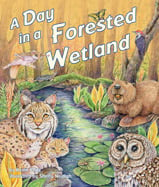Alignment to Standards for PA

| Grade | Number | Standard |
|---|---|---|
| K-3 | 3.3.4A. | Know the similarities and differences of living things. |
| K-3 | 3.3.4A1. | Identify life processes of living things (growth, digestion, react to environment). |
| K-3 | 3.3.4A2. | some organisms have similar external characteristics: anatomical, appendages, type of covering, body segments; similarities and differences are related to environmental habitat. |
| K-3 | 3.3.4A3. | Describe basic needs of plants and animals. |
| K-3 | 3.3.4B. | Know that living things are made up of parts that have specific functions. |
| K-3 | 3.3.4B2. | Determine how different parts of a living thing work together to make the organism function. |
| K-3 | 3.3.4C1. | Identify characteristics for animal and plant survival in different climates. |
| K-3 | 3.5.4A. | Know basic landforms and earth history. |
| K-3 | 3.8.4B1. | Identify and distinguish between human needs and improving the quality of life. |
| K-4 | 4.1.4A. | Identify various types of water environments. |
| K-4 | 4.1.4A1. | Identify the lotic system (e.g., creeks, rivers, streams). |
| K-4 | 4.1.4A2. | Identify the lentic system (e.g., ponds, lakes, swamps). |
| K-4 | 4.1.4C. | Identify living things found in water environments. |
| K-4 | 4.1.4C1. | Identify fish, insects and amphibians that are found in fresh water. |
| K-4 | 4.1.4C2. | Identify plants found in fresh water. |
| K-4 | 4.1.4D. | Identify a wetland and the plants and animals found there. |
| K-4 | 4.1.4D1. | Identify different kinds of wetlands. |
| K-4 | 4.1.4D2. | Identify plants and animals found in wetlands. |
| K-4 | 4.1.4D3. | Explain wetlands as habitats for plants and animals. |
| K-4 | 4.1.4E. | Recognize the impact of watersheds and wetlands on animals and plants. |
| K-4 | 4.1.4E2. | Identify the role of watersheds and wetlands for plants and animals. |
| K-4 | 4.3.A. | plants, animals and humans are dependent on air and water. |
| K-4 | 4.3.C. | Understand that the elements of natural systems are interdependent. |
| K-4 | 4.3.C1. | Identify some of the organisms that live together in an ecosystem. |
| K-4 | 4.3.C2. | Understand that the components of a system all play a part in a healthy natural system. |
| K-4 | 4.3.C3. | Identify the effects of a healthy environment on the ecosystem. |
| K-4 | 4.4.4C2. | Identify what plants and animals need to grow. |
| K-4 | 4.6.A. | Understand that living things are dependent on nonliving things in the environment for survival. |
| K-4 | 4.6.A10. | Identify a simple ecosystem and its living and nonliving components. |
| K-4 | 4.6.A2. | Describe the basic needs of an organism. |
| K-4 | 4.6.A3. | Identify basic needs of a plant and an animal and explain how their needs are met. |
| K-4 | 4.6.A4. | Identify plants and animals with their habitat and food sources. |
| K-4 | 4.6.A6. | Describe how animals interact with plants to meet their needs for shelter. |
| K-4 | 4.6.C. | Identify how ecosystems change over time. |
| K-4 | 4.7.4A. | Identify differences in living things. |
| K-4 | 4.7.4A1 | Explain why plants and animals are different colors, shapes and sizes and how these differences relate to their survival. |
| K-4 | 4.7.4A3 | Explain why each of the four elements in a habitat is essential for survival. |
| K-4 | 4.7.4B. | Know that adaptations are important for survival. |